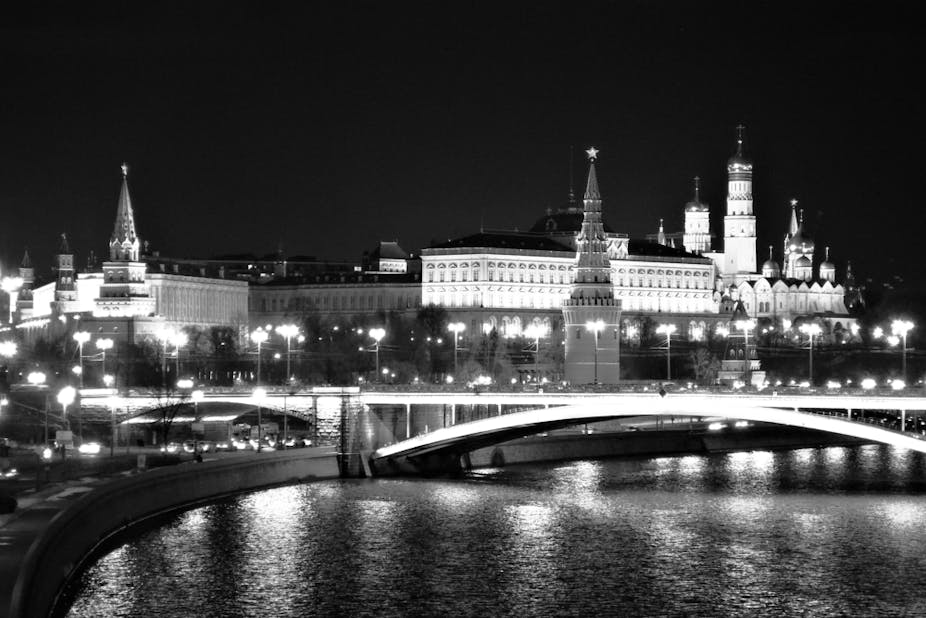This year marks the 100th anniversary of the Russian revolution. It began in February 1917 and reached a climax eight months later in October when the Bolsheviks seized power. A year of enormous significance in the nation’s history, it has so far received little attention in 2017.
It seems to be proving difficult for the current Russian government to decide how to commemorate or celebrate what happened 100 years ago. Revolution as a concept is something that Vladimir Putin has been attacking for years, ever since the “colour” revolutions first emerged on Russia’s doorstep in Georgia in late 2003.
The nation, in his view, has had enough of revolutions. For him, they disrupt people’s lives, causing harsh material deprivations, with a negative impact on the prosperity and power of states. And while Putin accepts that some countries do require serious political and economic reform, he believes evolution to be a better route. This is the path he wants Russia itself to take. Since the Arab Spring and subsequent civil wars in the Middle East, Putin has equated revolution with instability, extremism and terrorism.

It has also proved very difficult for Putin and his government to fit 1917 into the positive, patriotic and unifying version of Russian history they have been writing since 2000. Like the leaders of the USSR, Putin has used history to try to galvanise and unite Russian society behind his leadership – starting with schoolchildren.
In June 2004, the minister for education declared that school history textbooks should be rewritten to exclude “pseudo-liberalism, aimed at misinterpreting our history”. He suggested that certain textbooks were damaging Russia’s social cohesion and national pride.
A more “positive” way of viewing history was demonstrated prominently in 2012 when Russia marked the bicentenary of Napoleon’s invasion with unabashed patriotic celebrations. Putin was fighting an election campaign and delivered a rousing speech in which he talked of the “battle for Russia”, patriotism, national unity and self-sacrifice. He described his supporters as the natural successors of the 1812 generation, and his opponents as the foreign invaders.
The revolution, however, is difficult to fit into a positive, unifying vision. Many elements of the imperial power of Russia before 1917 are amenable to the current regime, so celebrating the February revolution is awkward. Even more so when you consider that attempts to build a Western-style liberal democracy are clearly out of sync with Putin’s authoritarian style of democratic politics.
Equally, Putin recently condemned the violence deployed against the clergy and other social groups after the October revolution. He blamed the Bolsheviks for Russia’s loss in the First World War. The creation of new socialist republics in the early 1920s had led to the dispersal of Russians outside of Russia and, in Putin’s view, laid the foundations for the collapse of the Soviet Union. In reclaiming Crimea and intervening in Eastern Ukraine, so the official line goes, Russia is only righting the wrongs caused by the revolution and bringing ethnic Russians back home.
All of this helps explain why it took until December 2016 for Putin to authorise the creation of a committee to organise centennial commemorations for 1917.

The committee is dominated by state officials, leaders of academic institutions, figures from the media and directors of museums and archives. At its first meeting in January it agreed a programme of conferences, exhibitions, publications, “educational projects”, and media activities. Those involved seem united in seeing the revolution as a complex process – but share the official line that the revolution was a tragic, undesirable experiment.
Russian resolve
Members declared repeatedly that the “historical lessons” of 1917 need to be emphasised to foster unity in contemporary Russia. Asked afterwards what the lessons of revolution were, one participant answered bluntly that revolution was not the best means of resolving social conflict as it leads only to violence and death.
The first main conference, held in February at the Cathedral of Christ the Saviour in Moscow, included a speech by the minister of culture, Vladimir Medinskii. He spoke of the “national tragedy” of a revolution that failed to solve Russia’s problems. His message echoed Putin’s call from his presidential address in December 2016: learn history’s lessons to strengthen reconciliation and only solidarity will ensure Russia’s success.
So it remains unlikely that we will see prominent national commemorations highlighting 1917 for what it actually was – a short-lived, euphoric experiment in civil liberties, equal rights and democracy. Instead the official “lesson” we seem destined to hear repeatedly this year is that revolution fosters violence and instability – and should be avoided at all cost.

